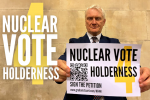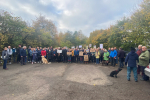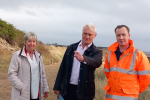Peter Levy: Mr Stuart, people would like to know your view. Are you for or against this for holding this? I know it's early days and you're going to hedge the answer, but people would like to know.
Graham Stuart: Well, the most important thing is that the facility is safe and it's up to nuclear waste services to prove it.
And then after that, what I'm looking for is that we have a referendum of people in Withernsea and the Holderness area before the project is actioned because we've been told it'll only happen with consent, but we don't yet know what form that would take.
At the moment, that isn't clear, and I think it should be determined by a referendum. Once we have got that, then I and the rest of the community want to engage with them, hear the details about whether it can be safe and then learn about the benefits for the area.
PL: But you are a great supporter of nuclear power to strengthen our UK energy security I would have thought that you would have been a supporter of this.
Also bearing in mind the million pounds for the local area, etc. But you're undecided at the moment?
GS: Well, I'm sceptical until I know what form that consent is going to take. I want to know that local people are going to have a real decision on whether this happens. Once we've got that, then, you know, I think all of us could enter into a conversation with confidence. Very happy to take £1m a year and have it used locally. We want to make sure it is used in the Withernsea and holding us area and isn’t siphoned off anywhere else.
If it can work for the local area and if it's good for people and it's safe and people want it, then sure, it would be great to play a part in Britain's burgeoning nuclear future.
PL: A year or so back, Theddlethorpe in Lincolnshire was suggested. It's on a short list now of three. Would Lincolnshire be a better place for this, do you think, than Holderness?
GS: Well, one of the issues I understand is to do with geology. So it's not just about whether local people are happy. If we want to start this conversation and have a community partnership, then we will have a million pounds a year to spend in the local area.
If, after a few years, we still want to go on, then they'll give us some more money and they would start to do geological, they'd drill and do that sort of work and find out if it is suitable.
So we don't know yet whether our geology will be suitable although it's suggested that our geology looks promising for this sort of facility.
PL: So to clarify, for you, nothing less than a referendum. If in the referendum people are against, end of story, that's it. It's over.
GS: That's what I'm, the rules say it should need consent. I want to know exactly what form that takes. I think it should be a referendum. Then everyone can be just calm, relaxed and listen. They know they're going to have the final say.
What we don't want is a situation where consent is something which we don't recognise. But I think we get the referendum.
You can't imagine people voting though to have radioactive waste buried near to where they live. You just can't see it happening somehow, can you?
GS: Well, that's NWS's job to convince us, isn't it? Show us the benefits, show us, talk us through, for a million pounds a year, going up to two and a half million pounds a year with many years to do it over, I'm sure, with the right reassurances, local people will be happy to listen, and then local people would decide. decide and if they don't want to decide yes, they should have to have it.
And possibly get the rail line back from Hull to Withernsea as well. Graham Stuart, good to have you on the programme. Thank you.
This is a transcript of Graham's interview with Peter Levy on BBC Look North on 26th January 2024.



